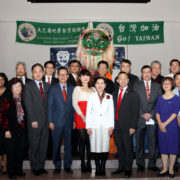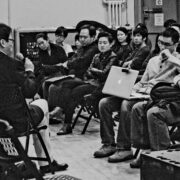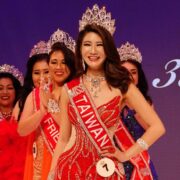“It Was the Wind”
Written by Angel Chen
This article is meant to highlight the talk to the Taiwanese American Perspectives organization by retired Vice-Admiral Lyle G. Bien to a banquet room full of eager, receptive and expectant Taiwanese-Americans. I too am eager, receptive and expectant, although of what, I am not entirely sure.
As I drive down the 405 to the Atrium Hotel in Irvine, my stomach muscles tighten, and I remember what I am in for. This is going to be like so many of the functions that my parents brought me to when I was young(er) and had that same iron-clad feeling of anxiety.
I barely speak Taiwanese or Mandarin, and these events are mostly held in a language outside of my comprehension. It is a time for my parents’ generation to get together and talk about, well; I’m not sure what, since I don’t speak the language. I, along with others of my generation get that familiar distant feeling and we convene at the kids’ table with our only common thread, our parents’ native country. I hold the title of Taiwanese-American, which potentially has a foothold in both identities, but sometimes feels like neither.
And that is my feeling on the talk tonight; it was neither here nor there. Ex-Vice-Admiral Bien was being honored for purportedly siding with the Taiwanese in the 1996 Taiwan Strait Missile Crisis by sailing his fleet of 13 ships carrying 13,000 sailors through the strait. China saw this as siding with Taiwan in their declaration of independence from mainland China control; Taiwan saw this as siding with Taiwan as well. Admiral Bien, however, saw this as safe sailing, due to wind conditions causing heavy seas from the beam that would have dangerously affected some of the smaller ships within the fleet.
By sailing directly north through the strait, thus putting the seas safely on the stern, these U.S. Navy ships under his command pulled into the Hong Kong harbor. Immediately upon arrival, they were besieged by newsmen, split between those favoring mainland China and those favoring Taiwan. His diplomatic response to them was of no political declaration as he and the U.S. Government view the strait as international waters.
He simply stated his reason for his ships’ passage, “It was the wind.” It was solely for necessity caused by the wind that he sailed through the strait. While we sit at a dinner intended to honor Mr. Bien for defending Taiwan, it appears he is at this occasion renouncing that intention, ever so politely.
It is important to note, he opened his talk with the disclaimer that he was speaking as a private citizen and not representing the U.S. Government. He also recognized America’s role as a super power and as a force for good. And, with the same good will, also remarked on the warm and courteous treatment he has received from the Taiwanese people.
He proceeded to discuss his private citizen views on government duty. The first duty of government is to provide for their nation’s defense. For capitalistic democracy the first order is there must be order, providing security for people to invest. He then went on about America as a model fledgling democracy. However, none of this really states what I am sensing the crowd wants to hear.
There is an obvious interest by the Taiwanese to be protected by American forces from Chinese threat. A question from the floor regarding the Taiwan Relations Act seemed to believe this resulted in U.S. protection. Mr. Bien’s response left that questionable. According to the Taiwan Relations Act, 1979, Title 22, Chapter 48, Sec. 3301b, there is U.S. interest in the peace and stability in the area of the Western Pacific and that these are matters of international concern. This policy extends between the people of the United States and the people on Taiwan as well as the people on the China mainland and all other peoples of the Western Pacific area. Another question compared Taiwan to the U.S. Territory Guam, and he also declined to see the relation. This seems a rather uncomfortable direction to be headed for many reasons.
Taiwan’s declaration of independence from China appears noble and self-affirmative. The wish to then be considered a territory by another super power, albeit one that has taken it upon herself to act as an upholder of human rights, seems a backwards step. Taiwan was once occupied by Japan, simply given to Japan by China as part of a war agreement. As a tiny island that has tremendously spirited, generous, warm-hearted and technologically advanced peoples it has nonetheless suffered at the mistreatment by other militarily stronger nations.
Is there still a threat from China? While impossible to see into the future, it is clear that China with 1.3 billion people and 7-9% economic growth yearly is an economic super power. China also holds a super power seat in the United Nations that allows it to conveniently veto any pro-Taiwanese sentiment. Taiwan and China are a David and Goliath story. It’s obvious the interests of Taiwanese-Americans for American military support and protection.
The Taiwanese American Perspectives group is a very tight-knit and committed community, and with these qualities alone, huge strides can be made. After all nations are built upon these pillars. President Tom Liu made closing remarks thanking the previous presidents of the last four years. Dr. Dennis Chen, President of NATMA, North American Taiwanese Medical Association made the comment that the group is positively reaching out to Americans instead of staying in a close small community. Both these sentiments will carry the group and all Taiwanese-Americans into unity with one another as well as alliance with their new homeland.
It is true that security is a necessary first step before investment. Taiwan’s interests are clear. What we then will be watching in the years to come is the triangulation between America-Taiwan-China. These issues of identity and belonging are crucial positioning steps in establishing said security. This is true on a national level as well as personal.
My parents and I are both considered first generation Taiwanese-American. Speaking only for myself, I imagine they feel more Taiwanese and I feel more like an American. What does this have to do with the fate of Taiwan?
I can’t speculate on that. We could take a “wait and see” attitude, but that would be just like leaving it up to the wind. I am neither politician nor journalist; I am an artist and writer. However, I am Taiwanese-American, and I have related first-generation immigrant concerns and allegiances.
Source from Thomas Liu / 04/2016
Posted in 04/2016





